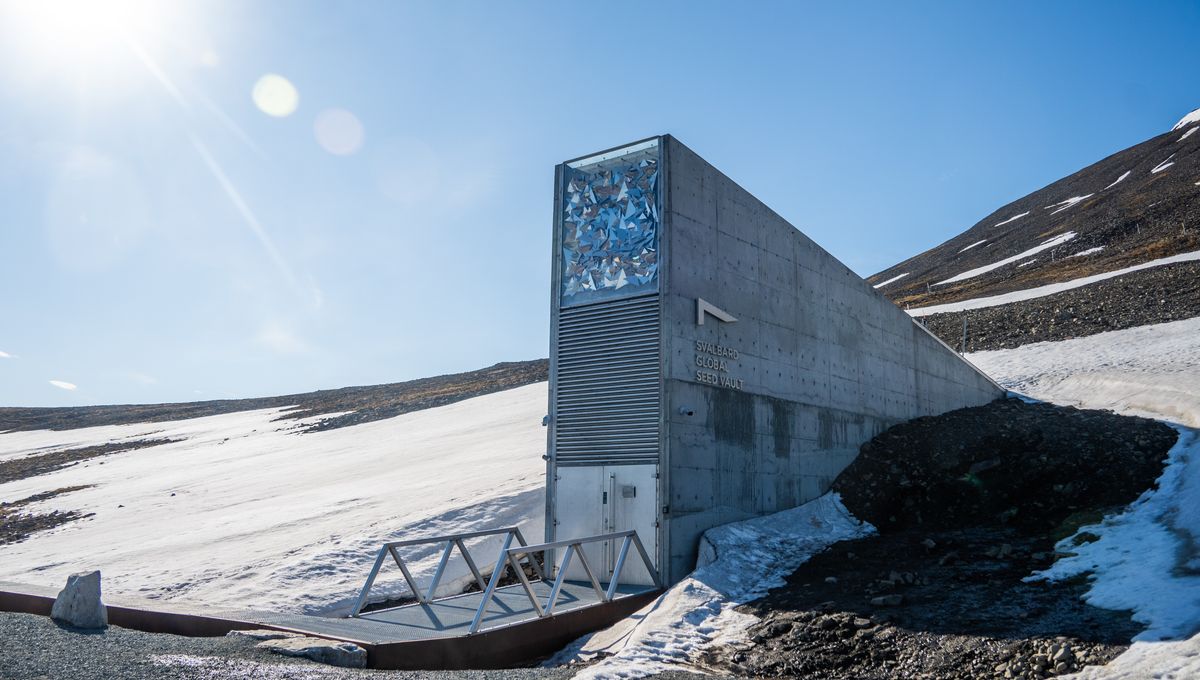
Over 14,000 new samples of food crop seeds are being added this week to a “doomsday” vault located on an island in Svalbard, Norway. These seeds are part of an effort launched in 2008 to back up thousands of the planet’s essential plant species, ensuring a biodiverse future food supply. You know, saving for a “rainy day” in a world beset by ongoing conflicts and the challenges of climate change…
ADVERTISEMENT
The seeds have come from 21 gene banks from across the world and are being deposited in the cold chambers of the facility, known as the Svalbard Global Seed Vault.
Among these new samples are some essential varieties of crop seeds from a collection in Sudan, which has nearly been destroyed by the country’s ongoing civil war. The gene bank in Sudan is located in the city of Wad Medani and once had 17,000 seeds in its collection. However, during the conflict, militants raided the facility, scattering or looting many of the seeds.
The seeds being deposited in Svalbard this week include varieties of pearl millet and sorghum, a crop that has been cultivated in the region for thousands of years and that is both an important food source and a cultural crop.
“In Sudan, where conflict has displaced more than eight million people and disrupted agriculture, these seeds represent hope,” Ali Babikar, director of Sudan’s Agricultural Plant Genetic Resources Conservation and Research Centre (APGRC), explained in a statement.
“By safeguarding this diversity in Svalbard, we’re preserving options for a resilient, food-secure future, regardless of the challenges we face.”
The deposit also includes samples of so-called “velvet beans” – Mucuna pruriens – from Malawi. This crop supports sustainable agriculture and traditional medicine in the country and gets its nickname from the velvety hairs that cover the seed pods. Velvet beans are also nitrogen-fixing legumes that can be used as a fertilizer to double maize yields.
ADVERTISEMENT
Nolipher Mponya, an agricultural research scientist who works for the government of Malawi, said that ensuring the country’s seeds are protected not only “reduces the risk of food crises at local, regional, sub-regional and global levels”, but can also benefit the pollinators that inhabit crops, the health of the population, and the economy.
The Philippines have also made a deposit this week; the country’s gene bank has been deeply affected by a Category 4-equivalent typhoon and, just six years later, a devastating fire. The island nation ranks number one on the World Risk Index, which measures a country’s vulnerability and exposure to natural extreme events. At the same time, however, the country is also recognized as one of only 18 in the world with high enough genetic diversity to be labeled “mega-biodiverse”.
“The rapid loss of genetic diversity in the field and loss of diversity in our diets make conservation and accessibility more important than ever,” Hidelisa De Chavez of the University of the Philippines explained.
The entry of the seeds is the result of an international collaboration effort known as the Biodiversity for Opportunities, Livelihoods and Development (BOLD) project, which has been funded by the Norwegian government and managed by the Crop Trust, an NGO based in Bonn, Germany.
ADVERTISEMENT
“The seeds deposited this week represent not just biodiversity, but also the knowledge, culture and resilience of the communities that steward them,” said Stefan Schmitz, Executive Director of the Crop Trust. “We must find a way to protect this crop diversity for generations to come.”
Source Link: Over 14,000 New Seed Samples Added To Svalbard's "Doomsday" Vault